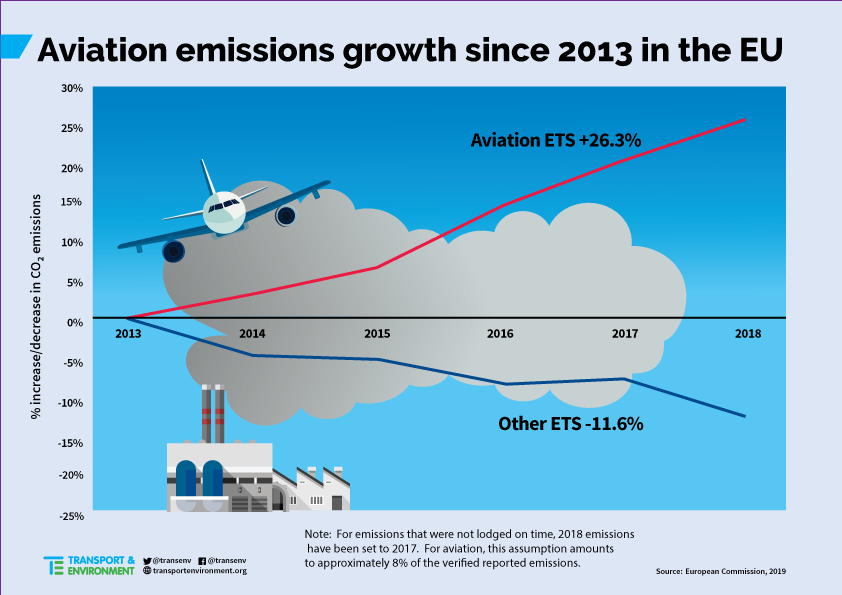
Interested in this kind of news?
Receive them directly in your inbox. Delivered once a week.
Airlines’ carbon emissions grew 4.9% within Europe last year – in contrast to the other emissions-trading sectors in the EU, which declined 3.9% overall. Carbon pollution from flying in Europe has risen 26.3% in the last five years – far outpacing any other transport mode.[1] [2]
Andrew Murphy, aviation manager at T&E, said: “When it comes to climate, Ryanair is the new coal. This trend will only continue until Europe realises that this undertaxed and under-regulated sector needs to be brought into line, starting with a tax on kerosene and the introduction of mandates that force airlines to switch to zero-emission jet fuel.”
T&E said it is no surprise that the most undertaxed mode of transport is also the one with the fastest growing CO2 emissions. That needs to end. Airlines should have their free emissions allowances in the EU emissions trading system removed, start paying tax on their kerosene, and be subject to VAT on their tickets – like all other transport sectors. Radically cutting aviation emissions would also require a shift to synthetic kerosene, produced from renewable electricity and carbon captured from the air.
But, instead, governments are pursuing a controversial UN offsetting scheme for aviation, known as Corsia, which will allow aviation emissions to continue growing. There are serious doubts over the environmental effectiveness of carbon offsets. Airlines can emit even more carbon by buying ultra-cheap offsets – where they invest in environmental projects, such as a hydrodam project which later collapsed, instead of reducing their own carbon footprint.
Andrew Murphy concluded: “Aviation is Europe’s biggest climate failure. The worst thing we can do in response is to put all our hopes in an offsetting scheme that gives airlines a license to grow indefinitely. But that is exactly what airlines have cooked up at the industry-dominated UN aviation agency. The time has come for a big change in Europe’s aviation policy.”
Note to editors:
[1] For emissions that were not lodged on time, 2018 emissions have been set to 2017. Only open ETS accounts are considered. For aviation, this assumption amounts to 5.5 Mt, approximately 8% of the verified reported emissions.
[2] The data is for emissions of flights within the current EU emissions trading system (EU ETS), which covers flights within Europe, with some exceptions (flights to the Canaries, Madeira, the Azores). In many cases, airlines’ global emissions will be even higher.


